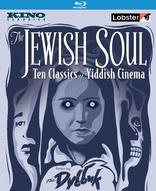The Jewish Soul: Ten Classics of Yiddish Cinema Blu-ray Movie
HomeThe Jewish Soul: Ten Classics of Yiddish Cinema Blu-ray Movie 
Kino Lorber | 1935-1950 | 10 Movies | 750 min | Not rated | Nov 24, 2020Movie rating
7.1 | / 10 |
Blu-ray rating
| Users | 0.0 | |
| Reviewer | 3.5 | |
| Overall | 3.5 |
Overview
The Jewish Soul: Ten Classics of Yiddish Cinema (1935-1950)
Too often segregated within an academic and cultural niche, Yiddish cinema is in fact a varied and vibrant genre ripe for reappraisal. Whether shot in the fields of Poland or makeshift studios in Manhattan, Yidishe Kino endure not only as precious documents of a vanishing culture, but a fascinating genre unto itself, with its unique blend of schmaltz and shtick, a dash of operetta, often overlaid with brooding atmosphere. Restored by Lobster Films, Paris, presented by Kino Lorber, this series showcases careful new translations by Yiddish cultural historian Allen Lewis Rickman, which preserve the clever wordplay and conveys the fluidity of the multi-lingual dialogue.
| Drama | 100% |
| Horror | 1% |
Specifications
Video
Video codec: MPEG-4 AVC
Video resolution: 1080p
Aspect ratio: 1.33:1
Original aspect ratio: 1.37:1
Audio
Yiddish: LPCM 2.0 Mono
Subtitles
English
Discs
Blu-ray Disc
Five-disc set (5 BDs)
Playback
Region A (B, C untested)
Review
Rating summary
| Movie | 4.0 | |
| Video | 2.5 | |
| Audio | 2.5 | |
| Extras | 3.0 | |
| Overall | 3.5 |
The Jewish Soul: Ten Classics of Yiddish Cinema Blu-ray Movie Review
Reviewed by Jeffrey Kauffman November 24, 2020If there's been any upside to being largely confined to my home during a global pandemic, one positive might be that I'm finally watching stuff that has been on my DVR for quite some time, in some cases, years. That was the exact situation with a great PBS documentary called GI Jews: Jewish Americans in World War II, which I must have recorded back in 2018 when it originally aired, but which I had never gotten around to viewing until just recently. One of the many interesting things the documentary got into is how when American Jews interacted with European Jews, notably when the concentration camps were liberated, that it was often up to the American Jews to communicate with the former prisoners. This wasn't because the American Jews were polyglots who were fluent in everything from German to French to Russian to any number of other languages, but because many of them had at least a smattering of Yiddish, the lingua franca (pun unavoidable) of Jews worldwide, until, of course, the Holocaust decimated a lot of the population who spoke it. In that regard, it's interesting to note that what is probably the most famous film in this set, and one that is prominently featured on the front cover as if to suggest its "marquee value", The Dybbuk, stems from a 1937 Poland only a couple of years away from a Nazi invasion. The earliest film in this set is The Yiddish King Lear, from 1935, while the latest, Three Daughters, stems from a decade and a half later in 1950, when the Yiddish film industry was already seriously in decline.
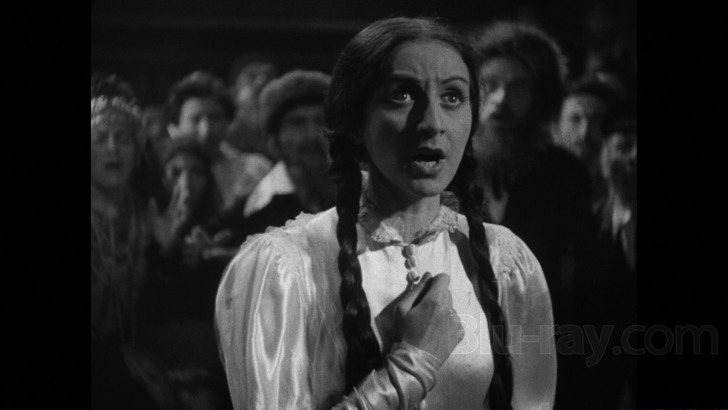
The films in this set are:
The Dybbuk. This 1937 film was culled from a famous play by S. Ansky which would have already been fairly well known to Yiddish speaking audiences of the day, perhaps one reason why the film version adds a whole "backstory" as a first act to the main tale that unfolded in the stage version. This is a fascinating look at a somewhat primitive society steeped in the magic of the Kabbalah, as it follows the star-crossed romance between Lea (Lili Lileana) and Chanan (Leon Liebgold). The two young Jews fall in love without knowing that their fathers were once best friends and actually promised to have their children marry. Unfortunately, though, greed enters the picture in more ways than one, with some tragic consequences, including what amounts to a demonic possession. The film has some sequences which come close to Abstract Expressionism, but at other times it's relatively more realistic despite the "out there" subject matter.
Mir Kumen On (Children Must Laugh). This 1936 quasi-documentary details the perhaps initially frightening idea of Jewish children being loaded aboard trains to be delivered to a camp, but in this case, it's a refuge for those susceptible to tuberculosis. This is a moving piece from the perspective of hindsight, as these kids are being filmed in the last few semi-halcyon days before all hell broke loose for them.
American Matchmaker. B-movie and/or noir fans may recognize director Edward G. Ulmer's name from such films as Detour, he also had a number of so-called "ethnic" features to his name, including this kind of sweet 1940 quasi-musical which stars Leo Fuchs as an unlucky in love guy named Nat Silver, who rather ironically decides to become a shadkhen (professional matchmaker). An essay by Allen Lewis Rickman in the insert booklet suggests this film has gained recent interest due to "its blatant gay subtext".
Overture to Glory is a 1940 melodrama that I might jokingly call The Opera Singer, in that it offers a tale at least somewhat similar to The Jazz Singer, offering a story of a guy with a cantorial background (played by Moyshe Oysher) who gets "seduced" by showbiz, albeit in this case, opera rather than jazz. This has a decidedly more tragic ambience than the Jolson film, but its emphasis on family and duty is somewhat the same.
Tevya may spell its focal character's name a bit differently, but he's the same curmudgeonly milkman that became so famous years later in Fiddler on the Roof. This 1939 film offers director and scenarist (adapting Sholem Aleichem, of course) Maurice Schwartz in the title role. Rather interestingly for a film of this vintage, it addresses so-called "interfaith" marriages with a startling alacrity that even the legendary musical may not.
The Yiddish King Lear is the earliest film in this set, stemming from 1935 (though some sources give an actual 1934 production date). This isn't "Shakespeare spoken in Yiddish", but instead the story of a father who attempts to divvy up his riches before departing for the Holy Land, but who sows chaos in his wake. This has a bit of what I'd almost call a kind of Yentl feeling in a way, in that the Cordelia character here wants to better herself, including with learning and getting out in the world, two things that were generally frowned on for women.
Her Second Mother. 1940 seemed to have been a banner year for Yiddish themed films, at least as evidenced by the surplus of outings from that year in this collection, but this is a kind of odd melodrama that has an almost Douglas Sirkian bent involving an adopted woman's attempts to help the family that has taken her in. An essay in the insert booklet by Allen Lewis Rickman calls this "Second Avenue shund — the network television of its day, i.e., brainless entertainment for tired working people".
Motel the Operator. This unabashed three hankie weeper deals with Motel (Chaim Tauber), who is a tailor who organizes a strike, which leads to calamity for his family, including the adoption of his infant son and the death of his wife. Things segue forward a generation or so, and in another plot that could have easily been made in the 1950s by Douglas Sirk, supposedly "secret" family relationships are revealed.
Eli Eli is another of the 1940 outings in this set, and one of several helmed by Joseph Seiden, who rather infamously co-wrote the exploitation "classic" Sex Madness, but who made a ton of Yiddish films over the course of his long career. This is another roiling melodrama involving two generations of a family, with some put upon parents finding out that the children they've sacrificed everything for aren't exactly clamoring to repay the debt when needed. A whole host of dysfunctional relationships between the parents and the kids ensue, with (kind of weirdly) occasional comedic and/or musical sidebars intruding.
Three Daughters was made in 1950 (according to this collection, though the IMDb lists 1949), and is evidently one of the last, if not the last, Yiddish films made for an increasingly sparse Yiddish speaking audience. This does seem made expressly for Americans, as it deals with the post- World War II desire on the part of many Jews to assimilate more completely, though in this case there's some conflict about also hoping to maintain a strong connection to Jewish tradition.
The Jewish Soul: Ten Classics of Yiddish Cinema Blu-ray Movie, Video Quality 
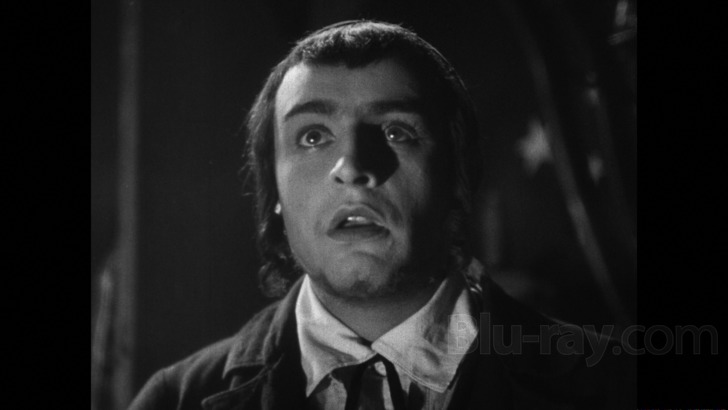
Note: Screenshots 1 through 10 are from the restored 123 minute version of The Dybbuk. Screenshots 11 through 29 are from
various other films in this set, and I've provided "duplicate" (or near duplicate) screenshots from some which help to illustrate the issue with subtitles
I'll discuss below. Finally, screenshots 30 through 36 show various text cards that are offered before several of the films with information. All but
one
of these are identified within the text itself (note that screenshots 31 through 34 are all related to Mir Kumen On). The one unidentified
screenshot is in position 35, and presages Tevya. Because only a total of 40 screenshots are allowed on any one review, I wasn't able to
get
all five disc menus uploaded, but the menu for Disc 5 looks exactly the same as the other four discs in the set, with the obvious difference of other
films
being listed.
The Jewish Soul: Ten Classics of Yiddish Cinema is presented on Blu-ray courtesy of Kino Classics, an imprint of Kino Lorber, and Lobster
Films with AVC encoded 1080p transfers in aspect ratios that all hover around 1.33:1, though with some a bit narrower, as can be seen in the
screenshots accompanying this review. Serge Bromberg's Lobster Films supervised the restorations in this set, collaborating with the Museum of
Modern Art, the Deutsche Kinemathek and the Filmoteka Narodowa in Warsaw. Both the text cards mentioned above as well as comments in the
insert booklet get into some of the technical datapoints of the restorations, but the bottom line here is the source elements are sadly not always in
the best shape, or frankly in a shape that could be restored to modern day standards. As such, virtually every presentation in this set is
littered with scratches, dirt, actual emulsion damage, and at times pretty widely variant contrast. That said, detail levels can often be surprisingly
good, especially in close-ups.
The biggest issue for some with the presentations here might be a conscious decision that was made to mask burnt in subtitles. This is mentioned
explicitly in the insert booklet with regard to The Dybbuk:
. . . Hebrew subtitles were burned into the celluloid and could not physically be removed. In this instance (and with other films in this collection), we have chosen to hide them behind discreet gray boxes, on which the new optional English subtitles are inscribed.You'll see an example of a "discreet gray box" (which can also be a "discreet box" of other shades at other moments) in screenshot 10, which, in terms of Hebrew subtitles might be understandable if not acceptable for some, but here's the thing: many of these films had burnt in English subtitles, which have also been masked, I'm assuming because this set offers advertised "new, improved" translations by Allen Lewis Rickman (who also contributes several interesting commentaries). This particular decision (i.e., masking burnt in English subtitles) might seem questionable when the "Rickman subtitles" are then superimposed over the masking of the original subtitles, making the viewing experience a little disjunctive. As mentioned above, I've tried to provide several examples of this decision in the screenshots accompanying this review. There are some presentations here that are certainly up in the 3.0 to 3.5 range, but others that I'd rate closer to 2.0, so the score above is an average for the entire set.
The Jewish Soul: Ten Classics of Yiddish Cinema Blu-ray Movie, Audio Quality 
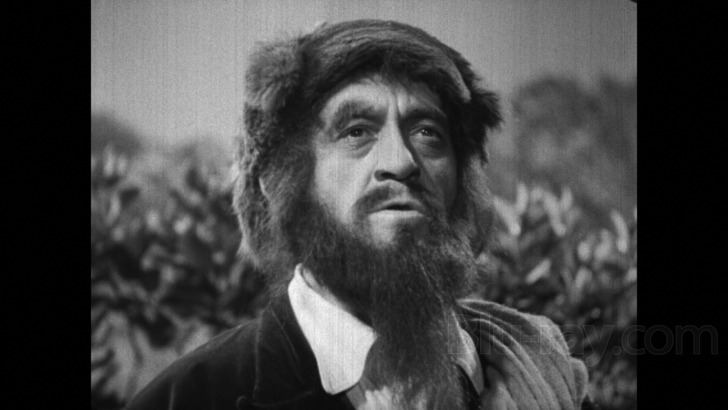
While a few other languages waft in and out of various films in addition to Yiddish, all the films in this set feature LPCM 2.0 Mono mixes. As with the video element, there are simply some limitations in the sources that create occasional obstacles. Many of the features sound pretty boxy, but there are also occasional issues like pops, cracks and minor distortion, along with more expected distractions like hiss. A number of the features offer musical performances, and things sound surprisingly spry quite a bit of the time in those sequences, although again within a pretty boxy overall sound. Depending on what "version" of the various films you watch, there are either optional or forced English subtitles available.
The Jewish Soul: Ten Classics of Yiddish Cinema Blu-ray Movie, Special Features and Extras 
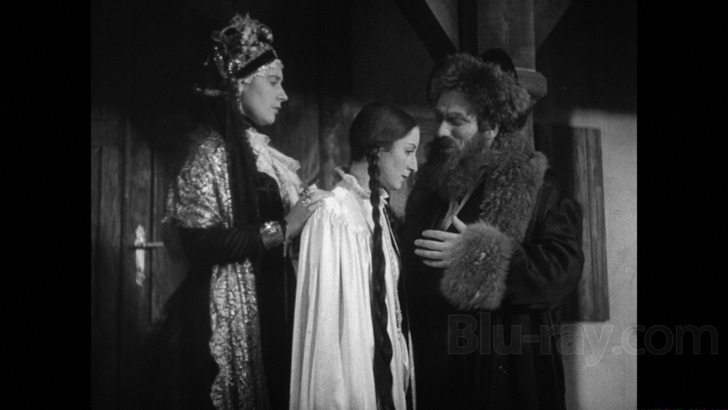
Disc One
- Audio Commentary on The Dybbuk by J. Hoberman, author of Bridge of Light: Yiddish Film Between Two Worlds
- Alternate 99 minute version of The Dybbuk
- Audio Commentary on American Matchmaker by Eve Sicular, Yiddish cultural historian
- Original subtitled version of American Matchmaker
- Audio Commentary on Overture to Glory by Allen Lewis Rickman, Yiddish theater historian and translator
- Audio Commentary on Tevya by Allen Lewis Rickman, Yiddish theater historian and translator
- Audio Commentary on Her Second Mother by Allen Lewis Rickman, Yiddish theater historian and translator
- Original subtitled version of Her Second Mother
- Original subtitled version of Eli Eli
The Jewish Soul: Ten Classics of Yiddish Cinema Blu-ray Movie, Overall Score and Recommendation 
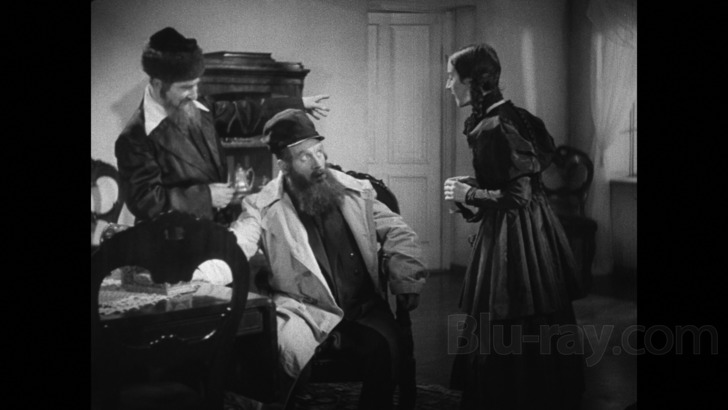
There's an almost incalculable historical importance to this release, and having seen some of these films myself over the years in what were basically public domain presentations, there's no doubt that many of these probably look and sound better than they have in decades, though even a quick perusal of the screenshots accompanying this review will show that image quality is variable. That said, my hunch is some videophiles are going to feel that Serge Bromberg and Lobster Films made an unforced error by masking the subtitles, instead of providing the "original" viewing experience (which they do for the three films I list in the Special Features and Extras section above as having an "original subtitled version"). My advice is to look over the screenshots and see how you feel about both the inherent presentational quality as well as the decision to mask subtitles and come to a decision about a potential purchase based at least partly on your reaction. The supplemental commentaries are generally very well done, and with caveats duly noted, The Jewish Soul: Ten Classics of Yiddish Cinema comes Recommended.
Similar titles
Similar titles you might also like

The Outcasts
1982

Time of the Wolf
Le temps du loup
2003

The Addiction 4K
Limited Edition
1995

Cronos 4K
1992

A Raisin in the Sun
1961

I Need a Ride to California
1968

Too Late Blues
1961

Dream Life
La vie rêvée / Slipcover in Original Pressing
1972

Even Dwarfs Started Small
Auch Zwerge haben klein angefangen
1970

The Touch
1971

Love on the Dole
1941

Speaking Parts
Slipcover in Original Pressing
1989

If Footmen Tire You What Will Horses Do?
Indicator Series
1971

The Grim Reaper
Indicator Series
1976

The Last of England
1988

A Hole in My Heart
2004

Elysia: Valley of the Nude
1933

The Garden
1990

Silver Bullets
2011

Ned Rifle
2015
